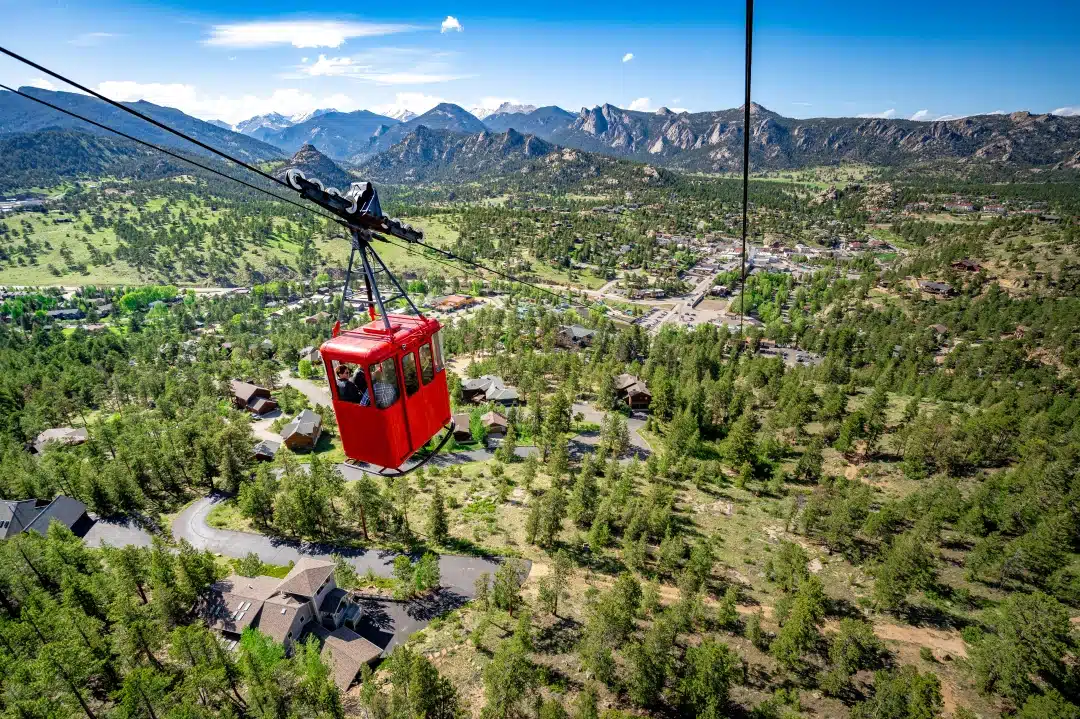A federal judge has ruled that Estes Park’s fee on short-term rental properties is constitutional and can remain in place, rejecting the arguments of two cabin owners there.
“It seems that property rights in Estes Park are dead,” cabin owner Rick Grigsby says.
In early 2022, a study commissioned by the Town of Estes Park determined there was a direct link between short-term rentals and a lack of affordable housing in the mountain town. Rentals decrease the supply of housing and drive up rent prices for residents, it found.
In response, the Estes Park Town Board proposed a $1,390 annual “impact fee” for the town’s roughly 500 short-term rentals, with the money going into a workforce housing fund. That’s on top of a $200 license fee. By comparison, an annual short-term rental license fee is $100 in Denver, $119 in Colorado Springs, $190 in Boulder, $260 in Vail and $394 in Aspen.
There was considerable debate before a March 2022 vote, with 150 residents testifying by email, Zoom and in-person, the Estes Park Trail-Gazette reported. Most were short-term rental owners and almost all were opposed. So, too, was Mayor Wendy Koenig. But the board approved the fee in a 4-2 vote and it went into effect on Jan. 1, 2023.
Rick and Cheryl Grigsby have lived in the tourist town since 1997 and owned rental cabins there for the past decade. When they refused to pay the impact fee for one of their three cabins, their rental license for that cabin was revoked. That costs them $30,000 per year, they say.
So, the Grigsbys sued the town in May 2023, claiming the impact fee is unconstitutional. Estes Park then asked that the couple’s lawsuit be dismissed in July. It was on Feb. 6.

Rick and Cheryl Grigsby own and operate the This Mountain Life cabins in Estes Park. (This Mountain Life)
“Plaintiffs make a strong case that the impact fee is not likely to solve much, if any, of Estes Park’s affordable housing issues,” U.S. District Judge Daniel Domenico wrote then. “The problem, however, is that even assuming that is true…courts do not — may not — strike down a law even if it may not succeed in bringing about the result it seeks to accomplish.”
“Even if it is debatable whether the impact fee will do anything to address the problem, it must be upheld,” Domenico explained, because “the power vested in elected, legislative officials, rather than appointed judges, is the primary method of government” in the U.S.
Reached by phone Monday, Rick Grigsby said that he is “very disappointed and surprised.”
“It’s devastating. We’re just a small little company, we’re seniors, and we put everything we had into this property, to have a way to live an independent life as we passed into our last chapters. So, it’s just devastating,” Grigsby said of Domenico’s decision.
“We’re not able to use our property as it’s intended, so it’s sitting unproductive. This is costing our little small business every day, because we can’t use it. We had created this property to be a short-term rental and we built it out according to that,” he explained.
The Grigsbys are represented by attorney Jennifer McCallum with the McCallum firm in Erie. She and Rick Grigsby said they are considering next steps, including a possible appeal.
Estes Park was represented by Ashley Hernandez-Schlagel, Andrew Nathan and Nicholas Poppe with Nathan Dumm & Mayer in Denver. The town declined to comment.
This is not the first time that Rick Grigsby has sued Estes Park and lost. In 2020, he and two others alleged in a lawsuit that the town had spent millions of dollars on a highway project without acquiring voter approval. That case was quickly thrown out by a Larimer County judge after he determined that no town money was being spent on the project.
A federal judge has ruled that Estes Park’s fee on short-term rental properties is constitutional and can remain in place, rejecting the arguments of two cabin owners there.
“It seems that property rights in Estes Park are dead,” cabin owner Rick Grigsby says.
In early 2022, a study commissioned by the Town of Estes Park determined there was a direct link between short-term rentals and a lack of affordable housing in the mountain town. Rentals decrease the supply of housing and drive up rent prices for residents, it found.
In response, the Estes Park Town Board proposed a $1,390 annual “impact fee” for the town’s roughly 500 short-term rentals, with the money going into a workforce housing fund. That’s on top of a $200 license fee. By comparison, an annual short-term rental license fee is $100 in Denver, $119 in Colorado Springs, $190 in Boulder, $260 in Vail and $394 in Aspen.
There was considerable debate before a March 2022 vote, with 150 residents testifying by email, Zoom and in-person, the Estes Park Trail-Gazette reported. Most were short-term rental owners and almost all were opposed. So, too, was Mayor Wendy Koenig. But the board approved the fee in a 4-2 vote and it went into effect on Jan. 1, 2023.
Rick and Cheryl Grigsby have lived in the tourist town since 1997 and owned rental cabins there for the past decade. When they refused to pay the impact fee for one of their three cabins, their rental license for that cabin was revoked. That costs them $30,000 per year, they say.
So, the Grigsbys sued the town in May 2023, claiming the impact fee is unconstitutional. Estes Park then asked that the couple’s lawsuit be dismissed in July. It was on Feb. 6.

Rick and Cheryl Grigsby own and operate the This Mountain Life cabins in Estes Park. (This Mountain Life)
“Plaintiffs make a strong case that the impact fee is not likely to solve much, if any, of Estes Park’s affordable housing issues,” U.S. District Judge Daniel Domenico wrote then. “The problem, however, is that even assuming that is true…courts do not — may not — strike down a law even if it may not succeed in bringing about the result it seeks to accomplish.”
“Even if it is debatable whether the impact fee will do anything to address the problem, it must be upheld,” Domenico explained, because “the power vested in elected, legislative officials, rather than appointed judges, is the primary method of government” in the U.S.
Reached by phone Monday, Rick Grigsby said that he is “very disappointed and surprised.”
“It’s devastating. We’re just a small little company, we’re seniors, and we put everything we had into this property, to have a way to live an independent life as we passed into our last chapters. So, it’s just devastating,” Grigsby said of Domenico’s decision.
“We’re not able to use our property as it’s intended, so it’s sitting unproductive. This is costing our little small business every day, because we can’t use it. We had created this property to be a short-term rental and we built it out according to that,” he explained.
The Grigsbys are represented by attorney Jennifer McCallum with the McCallum firm in Erie. She and Rick Grigsby said they are considering next steps, including a possible appeal.
Estes Park was represented by Ashley Hernandez-Schlagel, Andrew Nathan and Nicholas Poppe with Nathan Dumm & Mayer in Denver. The town declined to comment.
This is not the first time that Rick Grigsby has sued Estes Park and lost. In 2020, he and two others alleged in a lawsuit that the town had spent millions of dollars on a highway project without acquiring voter approval. That case was quickly thrown out by a Larimer County judge after he determined that no town money was being spent on the project.

